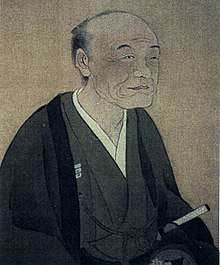Miura Baien
Miura Baien (三浦 梅園, September 1, 1723 – April 9, 1789) was a Japanese philosopher of the Tokugawa era. A scholar often qualified as prolific original thinker in economy, interested in epistemology,[1] he studied nature in a methodical way. He grounded his thought in Neo-Confucianism.
Miura Baien 三浦梅園 | |
|---|---|
 | |
| Born | 1723 Aki, Ōita, Japan |
| Died | 1789 Aki, Japan |
| Region | Japanese philosophy |
Main interests | Natural philosophy, Epistemology, Scientific method, Ethics, Symmetry |
Notable ideas | jorigaku |
Influences
| |
Influenced
| |
Life
Born as Miura Susumu into the family of a village physician in the present Ōita Prefecture (at that time named Bungo) on the island of Kyūshū, he became himself a physician and declined invitations to take office in the service of a local feudal lord. A master of Chinese language and poetry, he later became an advocate of a new rationalism.[2] He is notable for criticizing Christianity and European imperialism, arguing in Confucian terms that Christianity was used to subvert indigenous culture in order to facilitate colonization.[3]
Key ideas
- jorigaku
- gengo-zu diagrams
Key works
- Baien's Three "Go (words)"[4]
- Gengo (lit. Abstruse Talk), freely translated as Discourse on Methaphysics
- Zeigo (lit. Talking On and On), freely translated as Discourse on Corollaries
- Kango (lit. Presumtuous Talk), freely translated as Discourse on Morality
- Samidare shō, 1784, translated as Extracts in the Summer Rain[3]
- Heigo Fūji (lit. Confidential Matters on the Year Hinoe), 1786, a treatise on political, economic, military and legal affairs
- Kagen (lit. The Origin of Price)
- Logical Model of Earth Ecosystem
- collection of his work in Baien Shiryōshū (1989, Perikansha publication)
See also
References
- The Cambridge History of Japan: Early modern Japan, page 633
- Sources of Japanese Tradition, Vol. I, compiled by Ryusaku Tunoda, Wm. Theodore de Bary, Donald Keene, Columbia University Press, New York, 1958, p. 480
- Josephson, Jason Ā. (2012). The Invention of Religion in Japan. Chicago: University of Chicago Press. p. 54.
- Ancient Sages of the Oita prefecture Archived 2006-05-13 at the Wayback Machine Three Wisemen of Bungo
External links
- picture of the Miura Baien Historical Museum in the Oita prefecture opened in October 2000
- Miura Baien, 1723-1789, and His Dialectic & Political Ideas, by Gino K. Piovesana � 1965, Monumenta Nipponica, Vol. 20, No. 3/4 (1965), pp. 389–421
- "Logical Model of Earth Ecosystem" by Baien Miura by Tatsuya Kitabayashi, 2004
- Concerning Baien Miura and 'Reply to Taga' by Tatsuya Kitabayashi
- Philosophic projections, The Mathematical Intelligencer, Volume 30, Number 3 / September, 2008
- Miura Baien's Ethical Thought, in Annals of ethics
- blog post Aki / ?? by Joel Swagman featuring pictures of Miura Baien's house, dedicated museum, and grave, 2009
- A Study on the Diagrams by Baien Miura and Sontoku Ninomiya, Ritsuko Izuhara, 2001